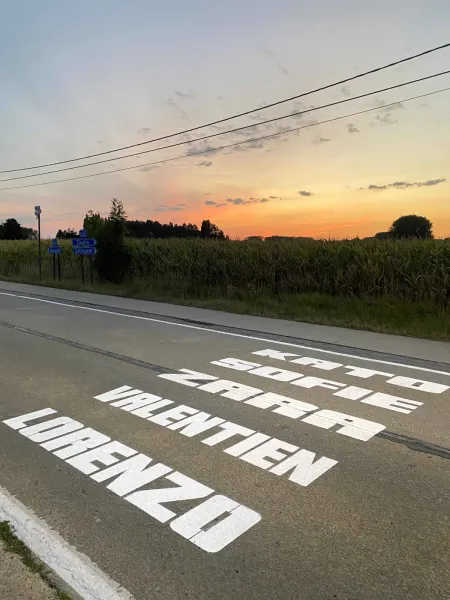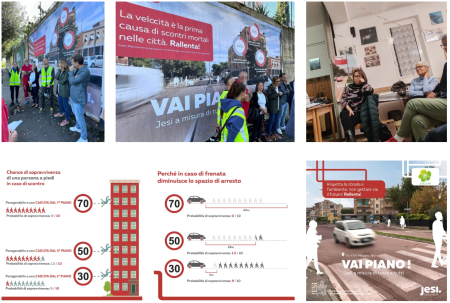Young adults 17-25

Friday, May 30, 2025
Our initiative addresses critical road safety challenges that are often overlooked in traditional driver education. Most driving schools focus on basic vehicle operation, but not on real-life risk anticipation, distraction management, or defensive mindset.
Key problems tackled by our VR Defensive Driving System include:
Driver distraction, especially due to smartphones and infotainment systems
Poor anticipation of traffic risks, particularly in urban and mixed traffic
Lack of situational awareness and understanding of the “big picture” around the vehicle
Insufficient consideration for other road users, including vulnerable groups
Specific risks related to pedestrians and cyclists, especially in city environments
Our project empowers drivers of all ages and experience levels to build mental habits that keep them and others safe – by learning to observe more, react earlier, and drive smarter.
Key problems tackled by our VR Defensive Driving System include:
Driver distraction, especially due to smartphones and infotainment systems
Poor anticipation of traffic risks, particularly in urban and mixed traffic
Lack of situational awareness and understanding of the “big picture” around the vehicle
Insufficient consideration for other road users, including vulnerable groups
Specific risks related to pedestrians and cyclists, especially in city environments
Our project empowers drivers of all ages and experience levels to build mental habits that keep them and others safe – by learning to observe more, react earlier, and drive smarter.

Thursday, May 29, 2025
We are addressing several key road safety challenges, particularly the high rates of fatalities and serious injuries on Irish roads, many of which are caused by drink driving. Between 1 January and 24 July 2024, there were 109 fatalities on Irish roads, 17 more than during the same period in 2023. Among these, 43 were drivers and 14 were motorcyclists. One of the major factors contributing to these fatalities is drink driving, with research showing that 37% of driver fatalities (from 2015-2019) involved a positive alcohol test.
To tackle this issue, the Government's Road Safety Strategy Action Plan 2021-2024 has outlined a need for targeted public education campaigns addressing the key causes of death and serious injuries, with a focus on high-risk groups. In April 2024, the Irish Government allocated additional funding to the Road Safety Authority (RSA) to combat the rising number of road deaths.
As part of this effort, we launched a pilot program featuring the Flinebox breathalyzer kiosks, starting at Electric Picnic, Ireland’s largest music festival. It uses advanced Drager alcohol sensor technology, where users blow into a straw, and the result appears on a screen in just 10 seconds. A disclaimer on the screen makes it clear that the breathalyser’s results are for informational purposes only and don’t have legal force. By making this technology easily accessible in social settings like festivals, we aim raise awareness and encourage individuals to make safer, more informed choices before getting behind the wheel
To tackle this issue, the Government's Road Safety Strategy Action Plan 2021-2024 has outlined a need for targeted public education campaigns addressing the key causes of death and serious injuries, with a focus on high-risk groups. In April 2024, the Irish Government allocated additional funding to the Road Safety Authority (RSA) to combat the rising number of road deaths.
As part of this effort, we launched a pilot program featuring the Flinebox breathalyzer kiosks, starting at Electric Picnic, Ireland’s largest music festival. It uses advanced Drager alcohol sensor technology, where users blow into a straw, and the result appears on a screen in just 10 seconds. A disclaimer on the screen makes it clear that the breathalyser’s results are for informational purposes only and don’t have legal force. By making this technology easily accessible in social settings like festivals, we aim raise awareness and encourage individuals to make safer, more informed choices before getting behind the wheel

Thursday, May 29, 2025
The 'EuroTarn' Association was set up in 1997 (by myself) to encourage young people to discover the countries of the European Union, and thus learn about other European cultures and languages. The association's motto from the outset was to inspire young people to 'move in a moving world'.
Between 1997 and 2007, we developed Universities exchanges with various regions. In 2007, we created some actions to attract young people (in the Tarn area) to be more interested in Europe, and to develop their 'European citizenship' and their feeling of belonging to a same European community; And Road safety was one of the very first topic that we decided to tackle with the very first European day of Road safety in April 2007. Therefore we decided to run campaigns to talk about Road safety and... Europe, and we decided to start to visit schools to educate young people.
Between 1997 and 2007, we developed Universities exchanges with various regions. In 2007, we created some actions to attract young people (in the Tarn area) to be more interested in Europe, and to develop their 'European citizenship' and their feeling of belonging to a same European community; And Road safety was one of the very first topic that we decided to tackle with the very first European day of Road safety in April 2007. Therefore we decided to run campaigns to talk about Road safety and... Europe, and we decided to start to visit schools to educate young people.
Thursday, May 29, 2025
The main road safety challenge that was addressed by the project is driving under the influence (DUI) and the impaired judgement and delayed reaction time as consequences. Driving under the influence of alcohol or drugs significantly impairs a driver's cognitive and motor functions, leading to poor decision-making and slower responses to hazards.
ARV-auto battles this challenge by:
o Creating awareness campaigns: Implementing targeted public education campaigns highlighting the dangers of impaired driving and promoting sober alternatives such as designated drivers and ride-sharing.
o Supporting law enforcement: Collaborating with local police on sobriety checkpoints and enhanced DUI patrols, especially during high-risk periods (e.g., weekends, holidays).
o Doing policy advocacy: Supporting stricter DUI laws, including lower blood alcohol content (BAC) limits and the use of ignition interlock devices for repeat offenders.
ARV-auto battles this challenge by:
o Creating awareness campaigns: Implementing targeted public education campaigns highlighting the dangers of impaired driving and promoting sober alternatives such as designated drivers and ride-sharing.
o Supporting law enforcement: Collaborating with local police on sobriety checkpoints and enhanced DUI patrols, especially during high-risk periods (e.g., weekends, holidays).
o Doing policy advocacy: Supporting stricter DUI laws, including lower blood alcohol content (BAC) limits and the use of ignition interlock devices for repeat offenders.

Wednesday, May 28, 2025
Program design to solve several road safety challenges for higher school students:
1. Expand Knowledge About Safe Road Traffic Practices
Many students lack formal education on road safety beyond basic traffic rules.
• Providing comprehensive road safety theory, including updated traffic laws, defensive driving techniques, and situational awareness.
• Teaching risk assessment skills, such as identifying potential hazards and understanding the impact of speed, fatigue, and distraction.
• Simulations and case studies that help students understand real-world consequences of unsafe driving behaviors.
2. To develop knowledge about the safety and use of micromobility vehicles.
Promote the correct use of bicycles, e-scooters and other micromobility vehicles as an alternative to promote green mobility culture.
• Offering specific modules on micromobility, covering legal regulations, safe riding practices, and correct equipment use (e.g., helmets, lights).
• Demonstrating shared space etiquette, including how to safely interact with pedestrians, cars, and other micromobility users.
• Promoting vehicle maintenance awareness, like checking brakes, battery levels, and tire conditions.
3. Road safety awareness, road culture and sense of responsibility.
Road safety is not only about knowledge and traffic roles, but also about attitudes and behaviors.
• Workshops on respectful and ethical driving, emphasizing patience, empathy, and mutual respect among all road users.
• Addressing aggressive driving behaviors, such as road rage, tailgating, and inappropriate honking.
• Fostering civic responsibility, encouraging students to act as positive role models and promote safe practices in their communities.
1. Expand Knowledge About Safe Road Traffic Practices
Many students lack formal education on road safety beyond basic traffic rules.
• Providing comprehensive road safety theory, including updated traffic laws, defensive driving techniques, and situational awareness.
• Teaching risk assessment skills, such as identifying potential hazards and understanding the impact of speed, fatigue, and distraction.
• Simulations and case studies that help students understand real-world consequences of unsafe driving behaviors.
2. To develop knowledge about the safety and use of micromobility vehicles.
Promote the correct use of bicycles, e-scooters and other micromobility vehicles as an alternative to promote green mobility culture.
• Offering specific modules on micromobility, covering legal regulations, safe riding practices, and correct equipment use (e.g., helmets, lights).
• Demonstrating shared space etiquette, including how to safely interact with pedestrians, cars, and other micromobility users.
• Promoting vehicle maintenance awareness, like checking brakes, battery levels, and tire conditions.
3. Road safety awareness, road culture and sense of responsibility.
Road safety is not only about knowledge and traffic roles, but also about attitudes and behaviors.
• Workshops on respectful and ethical driving, emphasizing patience, empathy, and mutual respect among all road users.
• Addressing aggressive driving behaviors, such as road rage, tailgating, and inappropriate honking.
• Fostering civic responsibility, encouraging students to act as positive role models and promote safe practices in their communities.

Monday, May 26, 2025
Road crashes is a major societal problem worldwide, especially in cities where pedestrians, cyclists and motorcyclists are highly exposed and vulnerable in case of a collision. The new policy of city-wide 30 km/h speed limit is intended to ensure vulnerable road users’ safety accounting for 70% of deaths in road crashes in urban areas in Europe.
Scientists urge continuously for lower speeds; however, speeding remains a model and sought behaviour among most drivers and riders, especially the young. The voices of vulnerable road users for less speeding remain weak towards our long-established car and speed-centred societies.
The National Technical University of Athens (NTUA) launched the innovative and original 30 Marathons in 30 months campaign (www.georgeruns30x30.com), aimed at promoting city-wide 30 km/h speed limit in all cities worldwide, as a key policy for safer, healthier and greener cities for all. The NTUA campaign was implemented by the internationally renowned NTUA Professor George Yannis, who is ranked 2nd in Europe and 9th worldwide in road safety science, and supported by the NTUA Road Safety Observatory (https://www.nrso.ntua.gr), a Centre of Research and Innovation Excellence on road safety with global recognition.
This impactful campaign represents a major shift towards a more human-centred approach to urban planning, where people are at the heart of design decisions.
Scientists urge continuously for lower speeds; however, speeding remains a model and sought behaviour among most drivers and riders, especially the young. The voices of vulnerable road users for less speeding remain weak towards our long-established car and speed-centred societies.
The National Technical University of Athens (NTUA) launched the innovative and original 30 Marathons in 30 months campaign (www.georgeruns30x30.com), aimed at promoting city-wide 30 km/h speed limit in all cities worldwide, as a key policy for safer, healthier and greener cities for all. The NTUA campaign was implemented by the internationally renowned NTUA Professor George Yannis, who is ranked 2nd in Europe and 9th worldwide in road safety science, and supported by the NTUA Road Safety Observatory (https://www.nrso.ntua.gr), a Centre of Research and Innovation Excellence on road safety with global recognition.
This impactful campaign represents a major shift towards a more human-centred approach to urban planning, where people are at the heart of design decisions.

Sunday, May 18, 2025
For a long time our roads have prioritized movement, and their design was left to traffic engineers.
But with the many challenges we face, streets need to serve more purposes beyond traffic flow. Streets are shared public spaces that should serve more goals (SDGs) and should reflect the diverse needs of all users. To turn this conversation around we launched “De rechtvaardige straat”(The Just Street).
The five guiding principles of the manifesto reframe how streets can be viewed and shaped. Creating a more inclusive, safe, and a more social and vibrant space between buildings. Safety is emphasized through thoughtful design that invites walking, cycling, and lingering without fear. Key elements include variety, accessibility, and active public participation in shaping the street environment.
Supported by thousands of citizens and hundreds of organizations, we offer this community actionable tools: inspiring content, events, and an annual action week. Together, we reclaim the street as a truly public space—where even drivers feel safe from making unintended mistakes, and all users can coexist with confidence and care.
Our goal is nothing less than systemic change: towards streets that foster safety, equity, and livability for everyone. Through De Rechtvaardige Straat, we are building a new understanding of what purpose streets serve and in parallel outline a new standard for road design and use—one that values every life and every journey. More safe streets as a result of more just and human centered streets.
But with the many challenges we face, streets need to serve more purposes beyond traffic flow. Streets are shared public spaces that should serve more goals (SDGs) and should reflect the diverse needs of all users. To turn this conversation around we launched “De rechtvaardige straat”(The Just Street).
The five guiding principles of the manifesto reframe how streets can be viewed and shaped. Creating a more inclusive, safe, and a more social and vibrant space between buildings. Safety is emphasized through thoughtful design that invites walking, cycling, and lingering without fear. Key elements include variety, accessibility, and active public participation in shaping the street environment.
Supported by thousands of citizens and hundreds of organizations, we offer this community actionable tools: inspiring content, events, and an annual action week. Together, we reclaim the street as a truly public space—where even drivers feel safe from making unintended mistakes, and all users can coexist with confidence and care.
Our goal is nothing less than systemic change: towards streets that foster safety, equity, and livability for everyone. Through De Rechtvaardige Straat, we are building a new understanding of what purpose streets serve and in parallel outline a new standard for road design and use—one that values every life and every journey. More safe streets as a result of more just and human centered streets.

Friday, May 2, 2025
Veilig Over is een initiatief dat ernaar streeft voetgangers veilig te laten oversteken en dat bovendien iedereen toestaat om ook zélf aan te duiden waar er nood is aan een veilige oversteekplaats, via een onlineplatform veiligover.be. Samen oversteken veilig maken, dat is de ambitie van ‘Veilig Over’. Dit doen we met een unieke samenwerking met lokale en regionale overheden & burgerparticipatie en citizen sciene & wetenschappelijke evaluatie (met Vias institute). Dit alles met als resultaat: de concrete verwezenlijking van een veilige oversteekplaats op het terrein!

Thursday, April 24, 2025
Due to the necessities of the road network, generally road works occur whilst roads are still open for use by all classes of road users. Hence it is important that the pedestrian, vehicular and cycling traffic is designed and managed to reduce the safety risks of users.
Research has shown that the risk of a serious traffic collision at or in a road works site is three to five times more than on other parts of the road network (CAREC, 2018).
The implementation and maintenance of the road safety measures at work sites is important but it is equally important that all road users understand and appreciate the safety risks and the operational aspects of such work sites.
We have identified the need for specific Road Safety Awareness Education and Training with FOCUS ON WORK SITES. This aspect is commonly omitted from general Road Safety Education Programmes. Road users, namely passengers, drivers, cyclists and pedestrians across different age groups are addressed.
Research has shown that the risk of a serious traffic collision at or in a road works site is three to five times more than on other parts of the road network (CAREC, 2018).
The implementation and maintenance of the road safety measures at work sites is important but it is equally important that all road users understand and appreciate the safety risks and the operational aspects of such work sites.
We have identified the need for specific Road Safety Awareness Education and Training with FOCUS ON WORK SITES. This aspect is commonly omitted from general Road Safety Education Programmes. Road users, namely passengers, drivers, cyclists and pedestrians across different age groups are addressed.

Wednesday, April 16, 2025
Una delle sfide principali riguarda una cultura radicata che privilegia l'uso dell'automobile, scoraggiando l'adozione di mezzi pubblici e di trasporti alternativi. Questo comportamento si riflette in un mancato rispetto delle normative del codice della strada. Inoltre, c'è una scarsa attenzione verso la protezione degli utenti più vulnerabili, come pedoni e ciclisti. Questo atteggiamento compromette la vivibilità della città, che viene vissuta più come un luogo di transito che come uno spazio di incontro e socializzazione.